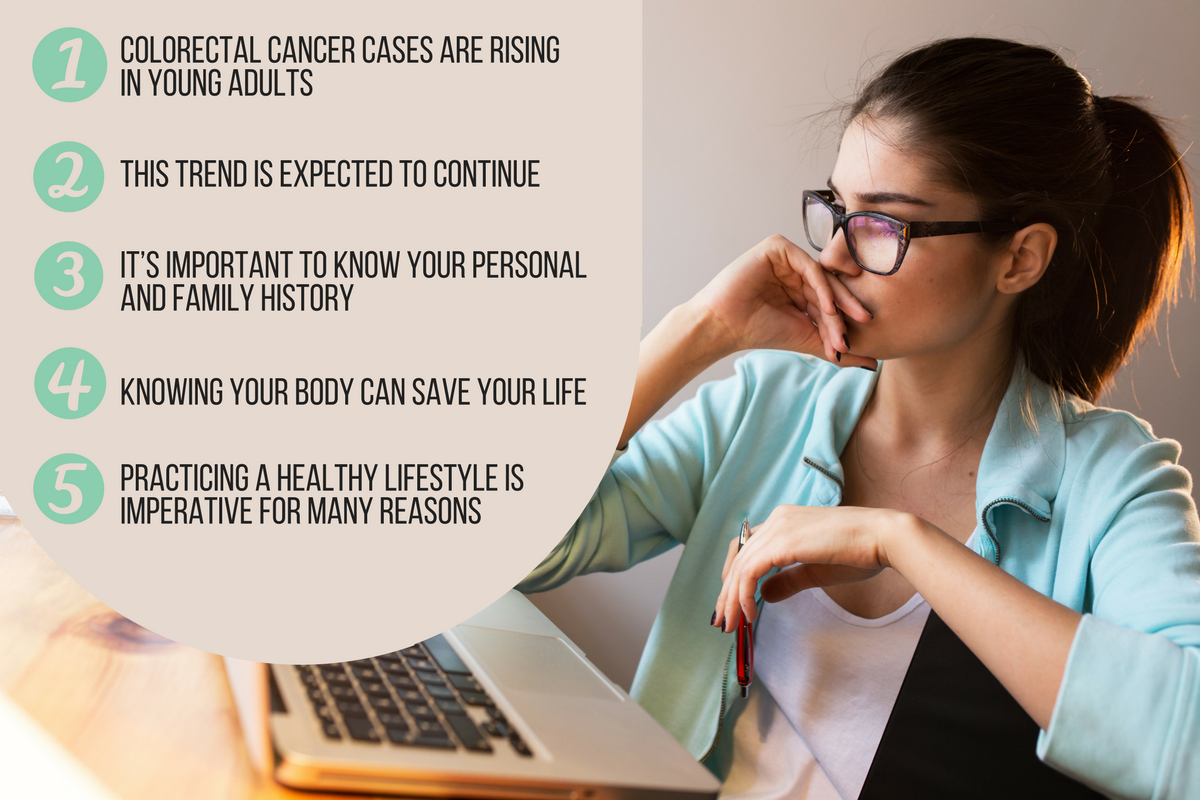
Cancer of the large intestine (colorectal cancer) is one of the most common cancers in the United States. In the past 20 years we have seen a steady decrease in the incidence of colorectal cancer, primarily because of improved screening and detection of precancerous polyps and early cancers. However, a concerning trend is on the rise: more young people being diagnosed and dying from colorectal cancer. Colorectal cancer incidences have been steadily increasing in people younger than age 50 over the last several years with current statistics showing 11% of colon cancer diagnoses and 18% of rectal cancer diagnoses occurring in people under the age of 50.
Summit Health Gastroenterologist, Dr. Konika Bose, who has treated colorectal cancer patients as young as age 35, is concerned by the trend saying, “Early-onset colorectal cancer is happening, and the reality is that you’re never too young to be at risk.”
While research is being conducted across many disciplines to identify the risk factors and recognize patterns in patients, it is limited, and the exact reason behind the uptick has not been identified. “There is a correlation with increasing obesity rates and sedentary lifestyle, however, some of the young patients we are seeing are actually not obese and physically active, so it is not so clear,” says Dr. Bose.
Although colorectal cancer rates in the younger population are predicted to continue to rise, it has not been enough for screening guidelines to change, and it is still recommended that average-risk adults get screened for colorectal cancer starting at age 50. Some groups such as the American Cancer Society do recommend starting at age 45, however this has not yet become the standard of care.
Therefore, medical professionals must be very focused on education and prevention as well as working to identify signs and symptoms in patients as early as possible. Young-onset colorectal cancer is diagnosed too late because many people are unaware that the symptoms that they are having could be signs of something as serious as cancer. “My mission as a health care provider is to increase awareness, educate on the importance of sharing personal and family medical history, and make sure people know and pay attention to all risk factors. Be in tune with your body, and if something does not feel right, see your primary care doctor or a specialist,” says Dr. Bose. She adds, “You are never too young or too healthy to see a doctor. Try having yearly physicals with your primary care doctor, and if there are symptoms that you are worried about, please see a specialist,” says Dr. Bose.
As with any disease, there are risk factors you can’t change, such as family and personal history. If that is your case, you should start screening earlier and get tested more often than those without risk factors. As an example, if you have a family member with colon cancer, you should consider starting your colonoscopies earlier, typically at age 40. Also, if you have other medical problems such as inflammatory bowel disease, you will probably need more frequent colonoscopies.
But for everyone else, there are always things you can do to better protect yourself and lower your risk of developing colorectal cancer. Below, Dr. Bose identifies risk factors to pay attention to and suggests simple actions you can take today to start protecting your colorectal health.
Colorectal Cancer Risk factors:
| Hereditary colon conditions such as Lynch syndrome or Familial Adenomatosis Polyposis Syndrome | African American heritage (some suggest starting screening at age 45) |
| BRCA1 gene carriers | Obesity |
| Personal history of adenomatous polyps | Diabetes mellitus |
| Inflammatory bowel disease | Diet – Red meat |
| Cystic fibrosis | Tobacco |
| History of radiation therapy in the abdomen-pelvis area | Excess alcohol ingestion |
Ways to protect colon health:
- Regular exercise
- Diet consisting of plenty of fruits, vegetables, and fiber
- Taking care of your overall health
If you are 50 years of age or older, you should get screened. If you are younger but concerned about colorectal cancer, discuss the risks and benefits of early screening with your primary care physician or gastroenterologist.
Konika P. Bose, MD is a member of Summit Health's Gastroenterology team. Dr. Bose specializes in a wide range of gastrointestinal issues with a primary focus on women’s health and colon cancer screening and prevention.
